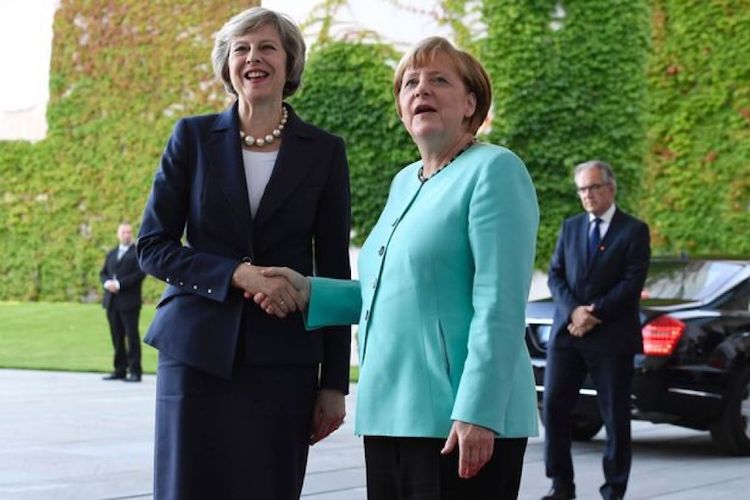Viewpoint by Jonathan Power*
LUND, Sweden (IDN-INPS) – Is Angela Merkel, Chancellor of Germany, responsible for Brexit? In a way yes she is because at the time of the great economic crisis of 2007-2013, counterproductively she insisted on austerity throughout the European Union. Austerity helped turn the poorer classes of the UK towards Brexit.
But so also are the people in high places who lied to the British electorate and persuaded them to vote in a referendum for it. So are those who have fanned the anti-immigrant flames all over Europe. Angela Merkel, in this case, was the most heroic of all the leaders of the West in going the other way and taking in one million, mainly Syrian, refugees.
Unfortunately, in the two years before the Brexit vote she made little effort to support the British government when it argued that it needed to be allowed to sharply reduce immigration from the EU.
Yet in 2004 when the EU took in ten mostly central European states the German government sought the right to restrict the free movement of labour for a period of up to 7 years.
Then one must add the peculiar dance steps of British Prime Minister Theresa May. She voted to stay in the European Union but then made a bid for power to become prime minister by immediately turning her back on her vote, agreeing to take the United Kingdom out. One year later, asked in a radio interview whether she would vote for “leave” in another referendum, she replied that she didn’t know. This is a devious woman.
The key issue in the British referendum was immigration. The working class especially feel they’ve taken the brunt of the problems that developed as immigration increased. It’s the working class who overwhelmingly voted for Brexit
Unjustifiably, when the British government approached the EU they were told they had to keep their door open. The UK was one of only three states who did. Strangely, the UK government did not fight particularly hard for an exception for itself. Immigrants were pouring in, straining health and educational services, especially in working class areas.
As The Economist magazine argued last September, other EU members have “long been amazed that, given Britain’s hostility to immigration, its government either under Theresa May or before under Gordon Brown and Tony Blair, has never applied the constraints allowed on the free movement principle.”
Britain is also a minority in having no registration system for EU migrants. Then it could have, as Belgian has long done, sent migrants back home who do not find a job after six months.
Most EU countries are tougher than Britain in insisting that welfare benefits cannot be claimed until a migrant builds up some years’ worth of national insurance contributions. (A form of tax to pay for state pensions.)
Likewise, the EU’s posted-workers directive is used by many countries to try and stop any undercutting of wage and its standards for working conditions.
Why didn’t the UK follow these compromises? The anti-immigrant vote would not have been so large in the referendum and Brexit would have never happened.
Merkel’s big mistake was her leadership during the great economic crisis. She amplified the economic crisis, which undoubtedly had an impact on the British economy and thus on the referendum vote. What was needed was more public spending not less.
This is what presidents Barack Obama and Donald Trump have shown, with the result that America has grown nearly twice as fast as Europe during the last decade.
As the greatest of all economists, John Maynard Keynes, noted in the 1930s, taxes should be cut during a downturn and raised during an upturn. This works to drive a depressed economy into renewed growth and to save money to pay off debt during an upturn. (This is the opposite of what a household should do in straightened circumstances – which is partly why public opinion doesn’t easily vote for the Keynesian solution unless it is given the quality of leadership that Obama showed.) Angela Merkel behaved like a thrifty housewife.
She used Germany’s immense economic power to force governments in trouble to slash government spending on pensions, health care and education. She insisted that Germany could not help the southern European nations that were in the most serious trouble, arguing that Greeks were lazy and profligate. They were, as were a majority of Italians and Spanish, but as a result the downturn was deepened severely.
Four European countries bucked the advice, Sweden, Portugal, Slovakia and Poland, and all have done well.
Europe now finds itself in an historic mess created by Britain and Germany. The EU, created to avoid war again in Europe, has become a seriously divisive issue. It’s ironic and tragic that the two countries that fought hardest in those wars are now responsible for undermining the EU. Theresa May should join Angela Merkel at the retirement door.
Note: For 17 years Jonathan Power was a foreign affairs columnist and commentator for the International Herald Tribune – and a member of the Independent Commission on Disarmament, chaired by the prime minister of Sweden, Olof Palme. He forwarded this and his previous Viewpoints for publication in IDN-INPS Copyright: Jonathan Power. Website www.jonathanpowerjournalist.com. [IDN-InDepthNews – 06 November 2018]
Photo: British Prime Minister Theresa May (left) and German Chancellor Angela Merkel (right). Credit. The Mirror
IDN is flagship agency of the International Press Syndicate.
facebook.com/IDN.GoingDeeper – twitter.com/InDepthNews

